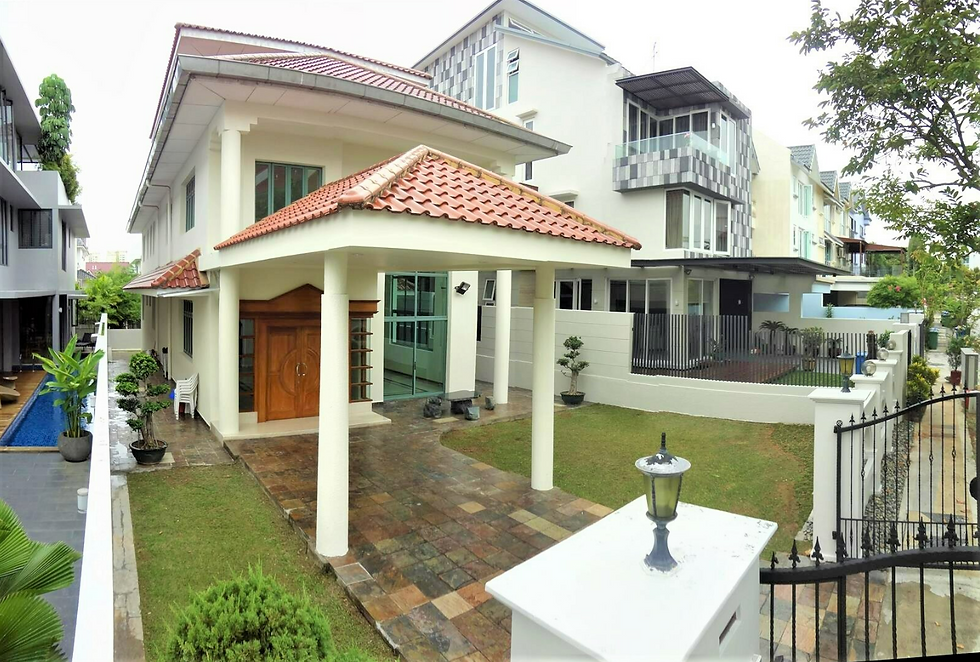If you're aiming for your first-ever landed property in Singapore, chances are you've already plunged headfirst into the labyrinth of real estate directories like Propertyguru. For many first-timers, the listings can be puzzling. Amidst the sea of numbers and figures, you might be left scratching your head and asking yourself, "What the heck do all these numbers mean, besides the jaw-dropping asking price?" But you’re not alone. It's a struggle we've witnessed many of our clients face when dipping their toes into the landed properties segment in Singapore. To make your life easier, I gathered my colleagues from SRI, Jackie and Rama, for a podcast. Between the three of us, we boast over 50 years of real estate experience – enough to tackle some of the FAQs that baffle aspiring homeowners like yourself.
Q1: Should I look at the PSF and built-up space?
First things first, "Price per Square Foot" is simply derived by dividing the total price by the land size. Yep, that includes everything from the garden to the driveway and backyard. But when we talk about built-up space, we're referring to the structure on that prized patch of land – the walls, the floors, the ceilings, and all the rooms where you'll be living your best life. So, which one should you be obsessing over?
Age of the property
First, it boils down to the age of the property. If you're eyeing an old-timer, one that's seen better days, then PSF (land size) should be on your radar. You see, the structure itself might not be worth all that much. Back in the good ol' days, some 15 years ago when PropertyGuru started out, PSF was the go-to measurement. But, if you're considering a newer, shinier abode, then built-up space is the one that deserves your attention. That's what most agents are flaunting these days. Why? Construction prices have been on the rise, and as we get bombarded by videos of fancy homes on social media, people are now more interested in what's inside the walls. After all, the build-up needs to match the current market's desires.
Plans to rebuild
The second big thing you should ponder on is your master plan for the property. Are you ready to roll up your sleeves and dive into rebuilding, or opt for renovation and A&A (Alteration & Addition)? Rebuilding might not be everyone's cup of tea. It comes with its challenges, like having to rent and live elsewhere for a while. Not to mention, it can be a logistical nightmare for those lacking the right contacts or know-how (been there, done that – read more about my own rebuilding journey here). Still, if you want to squeeze every drop of value out of your landed property, rebuilding is the way to go. Now, if you’re hunting for a fixer-upper, don't think your journey ends at PSF. Nope, there's more to consider. First off, figure out what you can do with that piece of land. Check the zoning regulations to know how high you can build – you don't want to end up reaching for the stars and getting slapped with a zoning violation.

Source Next, consider your rebuilding costs and the golden question: what will be the ultimate value of your revamped property? But don't go assuming that a 2-storey house always wins the race in the value department. The age of the building and its foundation play a crucial role.
A strong foundation might give a single-story home a competitive edge. And how can you tell if the foundation is up to snuff? Well, take a stroll to the backyard and see if things feel a bit... wonky. A sinking feeling might suggest that your potential home is resting on relatively soft ground, especially common in areas that used to be swampy.
But hey, don't rely solely on your gut instincts here. Engage a professional who knows the ins and outs of the segment before you whip out that offer letter.
Q2: Should I search by size or budget?
Now, let's talk about a common pitfall when people embark on their real estate search – they start with a specific budget in mind. Nothing wrong with that, right? Well, not entirely. The problem is, by doing so, they may be writing perfectly good listings off. Seeing “no results found” is a bit of a buzzkill.
Our advice? Keep the wallet and your options open. Resist the urge to set rigid parameters right from the start. Instead, explore your options with an open mind and decide how much work you’re going to put in only after visiting the site. Get yourself a savvy realtor who can help you get creative with your budget.
Here's a pro-tip from us – some of our colleagues might round off the numbers when listing a landed property to make it more searchable in those pesky directory filters. So, go ahead and search based on budget and location at the beginning of your quest.
Q3: How do I make sense of the photos?
Sometimes, the messiness of a place can be a major turn-off, making it hard to visualise its true potential. And then, on the other end of the spectrum, there's the risk of being catfished.
Fret not, there's a way to manage your expectations and avoid falling into the photo trap. That fine print might hold the key to the truth. You might find little disclaimers saying that the images are merely for illustration purposes – just like those "serving suggestions" on instant noodle packaging. It's all about showcasing the listing's potential, giving you a glimpse of what's possible if you decide to take the plunge and go for a rebuild.

Source Now, here's a golden tip for you – when you go for that much-anticipated viewing, keep your eyes peeled for other houses on the same street. Chances are, some of them might have already undergone some form of renovation, A&A, or even full-blown rebuilding. These can serve as inspiration for your own future dream home. And if none of the houses have been touched, consider yourself a trailblazer! You could be the first mover and set the price movement in motion
Fake listings of landed properties in Singapore
Speaking of fine print, start with the all-important question – is a legitimate realtor behind this listing. The golden rule here is to check for the CEA (Council for Estate Agencies) Licence.
A real estate agent will display both the CEA License for the Estate Agency and the Salesperson. Look for that "L" at the beginning of the estate agent's licence number, and an "R" at the start of the real estate agent's licence number. But don't just take their word for it; do a quick background check. CEA's got your back with a public register where you can verify if the agent is the real deal.
Honestly, navigating this segment of Singapore’s property market requires a lot more knowledge and experience than the lay person possesses. If you’d rather not go at it alone, and think you can benefit from having a realtor who doubles up as a consultant, consider reaching out to me (Harvey Chia) for a non-obligatory chat at 9199 9141.



Comments